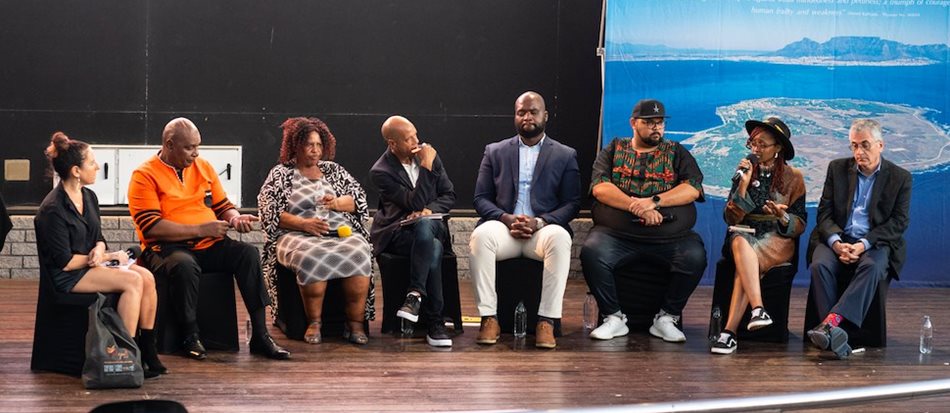
L–R: Dr Baz Dreisinger, Phyllis Mali, Mbongiseni Mdakane, Kofi Danson, Shaun Pretorius, Rose Thuku, Vincent Schiraldi. Photo: Dean Petersen
Global coalition for justice and prison reform Incarceration Nations Network (INN) has launched a new campaign to support the reintegration of formerly incarcerated people into society after they have served their prison terms.
Aptly called ‘Ban the Box’ it is a call to action to corporates, agencies, and businesses to pledge their commitment to ‘ban the box', the ‘box’ being that thing that needs to be ticked on job application forms in order to declare whether the applicant has ever been convicted of a crime or not to be eliminated.
“In countries all over the world – including in South Africa – people coming home from prison must check a box on job applications to indicate whether not not they have a criminal conviction, even if this has nothing to do with the requirements for the job,” says Dr Baz Dreisinger, INN founder and executive director. “Once that box is checked, they either become ineligible for the job or, at best, are extremely unlikely to get it.”
This, she says, keeps a whole cohort of people legally unemployed and, apart from being unfair, is not in any way beneficial to public safety. Giving people who have paid their debt to society a fair chance to obtain gainful employment and reintegrate is, she says, the motivation for the campaign, which has even garnered support from former President Barack Obama. And, with it gaining traction in the US, INN is now collaborating with local partners to push it forward in countries around the world.
‘Ban the Box’ was highlighted at a free public seminar and open discussion session hosted by the Robben Island Museum.
The seminar, entitled The Crisis of Post-Prison Reintegration in South Africa and the World, was held at the Amphitheatre at the V&A Waterfront on Thursday 10 November 2022 and was preceded by the screening of a short film. The film, entitled ‘Homecoming’ is part of a global docuseries that has been developed by INN and premiered at The Tribeca Film Festival in New York.
The seminar was officially opened by Mr Tshimangdazo Nemaheni, the chief heritage officer of the Robben Island Museum with closing remarks given by Mrs Ayanda Woji – the senior manager PHED of Robben Island Museum.
The seminar featured a panel discussion hosted by Dr Baz Dreisinger with a line-up that included:
- Former New York City commissioner of Corrections, Vincent Schiraldi
- INN’s partner in Kenya, Nafisika Trust, Rose Thuku
- INN’s partner in Cape Town, The Message Trust, Shaun Pretorius
- Unisa’s Mbongiseni Mdakane, who served seven years in prison and who is now a professor at the university
- Robben Island Museum council member and ex political prisoner, Litha Jolobe
- Ex political prisoner, Phyllis Mali.
Also participating was Kofi Danson from South Africa's only university-in-prison programme, The Ubuntu Learning Community, a project of Stellenbosch University and an INN partner.
There was a special musical performance by Chad Saaiman.
The event also marked the launch of The Writing on the Wall project in South Africa, a collaboration between Dr Dreisinger, the INN, renowned African American artist Hank Willis Thomas and a growing list of design and production partners.
The Writing on the Wall is a shapeshifting, multi-media artwork made from essays, poems, letters, stories, diagrams and notes written by people in prison around the world and is a powerful visual intervention in the public space.
Flowing from this is The Writing on the Wall as Enterprise project, an initiative that is creating a global community of formerly incarcerated entrepreneurs and business owners. INN provides micro financing for these businesses and brands them with the Writing on the Wall design.
A partnership of global organisations, the project also aims to offer entrepreneurship and small business development workshops. A 12-country marketing campaign, planned for Brazil, South Africa, India, Colombia, Jamaica, Argentina, Trinidad, The Netherlands, Kenya, Australia, the UK and the Czech Republic, showcases these businesses, promotes reintegration and fights the stigma attached to having been incarcerated.
In South Africa, the first business to be launched in partnership with The Message Trust is The Coffee Truck in Cape Town. This will be run by formerly incarcerated people. The Message Trust works to support people coming home from prison with job training and more. The aim is for The Coffee Truck to be permanently positioned at The Waterfront in Cape Town.
“Our aim is to shift public attitudes towards people who have been incarcerated so that they are afforded the opportunities they should have had in the first place, if not for radical inequality and legacies of systemic racism,” says Dreisinger. “Globally, incarcerated people are among the most disadvantaged people in society, both when they enter prison and when they’re cycled out of the system. This has to change, not only for the benefit of the people involved, but for the benefit of society as a whole.
“As Nelson Mandela put it so succinctly: ‘Money won’t create success; the freedom to make it will’.”
